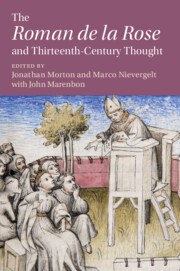Book contents
- The Roman de la Rose and Thirteenth-Century Thought
- Cambridge Studies in Medieval Literature
- The Roman de la Rose and Thirteenth-Century Thought
- Copyright page
- Contents
- Contributors
- Acknowledgements
- Note on Primary Texts
- Introduction
- Part I Epistemology and Language
- Part II Natural Law, Politics, and Society
- Part III Unfinished Business
- Chapter 8 Jean de Meun, Boethius, and Thirteenth-Century Philosophy
- Chapter 9 The Romance of the Non-Rose
- Chapter 10 Metalepsis and Allegory
- Notes
- Bibliography
- Index
- Cambridge Studies in Medieval Literature
Chapter 9 - The Romance of the Non-Rose
Echoes and Subversions of Negative Theology in Jean de Meun’s Roman de la Rose
from Part III - Unfinished Business
Published online by Cambridge University Press: 17 June 2020
- The Roman de la Rose and Thirteenth-Century Thought
- Cambridge Studies in Medieval Literature
- The Roman de la Rose and Thirteenth-Century Thought
- Copyright page
- Contents
- Contributors
- Acknowledgements
- Note on Primary Texts
- Introduction
- Part I Epistemology and Language
- Part II Natural Law, Politics, and Society
- Part III Unfinished Business
- Chapter 8 Jean de Meun, Boethius, and Thirteenth-Century Philosophy
- Chapter 9 The Romance of the Non-Rose
- Chapter 10 Metalepsis and Allegory
- Notes
- Bibliography
- Index
- Cambridge Studies in Medieval Literature
Summary
Jean’s Rose, like that of Guillaume de Lorris, is a site of hermeneutic resistance that defies analysis and univocity. The second author in particular uses the integumentum to cultivate an unsettling relationship to University learning, somewhere between the popularisation of academic science and the desire to transgress and to digress. The romance’s final pages, when the pilgrim sets out on the road to paradise and when obscenity and soteriology become inextricably entangled, reveal the importance of hermeneutic negativity in Jean de Meun’s writing, echoing Reason’s oxymoronic speech on love and Genius’s doctrine of natural generation. Drawing on the Augustinian idea of interior speech in search of divine union and the spiritual inheritance of Neoplatonic and Cistercian negative theology, the end of the romance delights in subverting the paradigms of negative mysticism as much as it enjoys revelling in the artful obscenity of the pilgrim’s penetration of the ‘sanctuary’ of the Rose. This chapter investigates the workings of such negativity, which tests language by continually upending meaning and the pilgrim’s quest itself, leading to the destabilizing chaos of a paradoxical Rose-non-Rose.
- Type
- Chapter
- Information
- The ‘Roman de la Rose' and Thirteenth-Century Thought , pp. 194 - 209Publisher: Cambridge University PressPrint publication year: 2020



